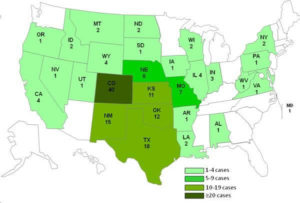By Jeffrey Weissinger, COO of Kitchens with Confidence
You need not dig into the news today to read about Listeria and the dangerous effects that is has on people, especially those who are pregnant, elderly and those that are immuno-suppressed. Most recently, there was a recall for Colby and Colby Jack Deli Cheeses sold by Meijer stores. This product was sold from November 10, 2016 to February 9, 2017. Deli meats and cheeses are food stuffs that have a high risk for contamination from Listeria.
What causes listeriosis? Listeriosis is food poisoning that is caused by eating foods that are contaminated with the bacteria, (L. monocytogenes). Listeria is found in both soil and water. Our vegetables can become contaminated from the soil they grow in or on, and the manure that is used as a fertilizer. Animals can carry the bacteria, thus contaminating the meat and dairy that we harvest from them. Cold cuts (deli meats), unpasteurized milk and soft cheeses are another source of the bacteria as they can become contaminated after processing.
Listeriosis infections in pregnant women can lead to premature labor, miscarriage, infection of the newborn, or even stillbirth. 1 Adults aged 65 or older, and those with weakened immune systems are more susceptible to become infected with the Listeria bacteria. CDC estimated that Listeria is the third leading cause of death from foodborne illness in the United States.2 An estimated 1,600 people get sick from Listeria each year, and about 260 die.3 Most healthy adults and children who consume contaminated food experience only mild to moderate symptoms.
Outbreaks of listeria are becoming more common place in our society and we need to be very careful with how we handle our food, and the personal sanitation of those that handle the food. Since 2011 there have been 12 multistate outbreaks of Listeria. September 2011, Jensen Farms in Colorado, had grown cantaloupe that was found to have infected 146 people in 28 states. The picture to the right shows the breakdown of the cases per state. This outbreak was responsible for 30 deaths and there was one pregnant woman who suffered a miscarriage.4
Soft cheeses made with unpasteurized milk are estimated to be 50 to 160 times more likely to cause Listeria infection than if are made with pasteurized milk. Raw sprouts, melons, hot dogs, lunch meats, cold cuts and smoked seafood are all items that need to be consumed with caution as they are all known to have a higher likely hood to contain Listeria.5
Other ways to prevent listeriosis:
- Bag raw meat and fish separately from other foods
- Wash your hands properly before and after handling food
- Wash fresh fruits and vegetables by rinsing them well with running water
- Store foods safely, ensure that your refrigerator is set at 40 degrees Fahrenheit or colder
- Ensure that you use a clean thermometer to check that all foods are cooked to the proper temperature
- Reheat leftovers to at least 165 degrees Fahrenheit
- Keep cooked hot foods at 140 degrees Fahrenheit or above
- Keep cold foods at 40 degrees Fahrenheit or below
- When in doubt throw it out – reheating contaminated food will not make it safe.6
It is very important that we are all aware of how easy it is for the inadvertent spread of Listeria. Education about the bacteria is the first step in prevention. If you would like to learn more about Listeria take this short 12 question quiz. Food Bacteria Quiz: How much do you know about Listeria?
Sources:
1 “What are the symptoms of Listeria infection” About-Listeria.com, http://www.about-Listeria.com/Listeria_symptoms_risks/#.WKMRi_krI9A, (February 14, 2017)
2 “People at Risk” Centers for Disease Control and Prevention, https://www.cdc.gov/listeria/risk.html, (February 14, 2017)
4 “Multistate Outbreak of Listeriosis Linked to Whole Cantaloupes from Jensen Farms, Colorado (Final Update)” Center for Disease Control and Prevention, https://www.cdc.gov/listeria/outbreaks/cantaloupes-jensen-farms/index.html, (February 14, 2017)
5 “Prevention” Centers for Disease Control and Prevention, https://www.cdc.gov/listeria/prevention.html, (February 14, 2017)
6 “Topic Overview” WebMD, http://www.webmd.com/food-recipes/food-poisoning/tc/listeriosis-topic-overview, (February 14, 2017)



